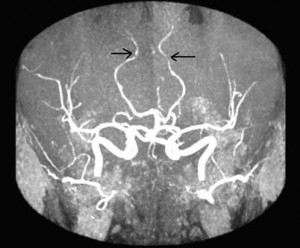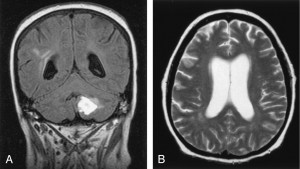Cerebral Vasculitis Definition
Page Contents
- 1 Cerebral Vasculitis Definition
- 2 Cerebral Vasculitis Causes
- 3 Cerebral Vasculitis Symptoms
- 4 Cerebral Vasculitis Diagnosis
- 5 Cerebral Vasculitis Differential Diagnosis
- 6 Cerebral Vasculitis Treatment and Management
- 7 Cerebral Vasculitis Prognosis
- 8 Cerebral Vasculitis Complications
- 9 Cerebral Vasculitis Life Expectancy
- 10 Cerebral Vasculitis Prevention
- 11 Cerebral Vasculitis Support Groups
Vasculitis a condition is characterized by inflammation of the blood vessel walls. Cerebral Vasculitis is one form of this disease that involves the CNS. It usually involves the brain and at times, the spinal cord. Sometimes, the word “Vasculitis” in the name of the condition is replaced by “Angiitis”. It is a very rare, but potentially life threatening disorder. However, the mortality rate associated with the disease is unknown.
The condition is also known as Central Nervous System Vasculitis.
Cerebral Vasculitis Causes
According to researches, Primary Central Nervous System Vasculitis is often present without any specific underlying cause. The disease commonly occurs as an associated disorder along with other medical conditions like:
Picture 1 – Cerebral Vasculitis
- Infections
- Some connective tissue disease (such as rheumatoid arthritis and systemic lupus Erythematosus)
- Other types of systemic Vasculitis (such as Polyarteritis Nodosa and Wegener’s Granulomatosis)
- Some types of cancer (specifically lung cancer, leukemia and lymphomas)
- Behçet’s disease
It also occurs due to the usage of certain drugs and medications (cocaine, heroin and amphetamine). CNS Vasculitis may imitate and be imitated by several other disorders that involve the brain’s blood vessels in a diffuse manner. These include:
- Thrombotic Thrombocytopenic Purpura
- Fibromuscular Dysplasia
It may also occur as a rare complication of various diseases.
Cerebral Vasculitis Symptoms
The symptoms resulting from this type of Vasculitis are often confused with those of various other conditions. This makes it more difficult to diagnose the condition at an early stage. The reduction in the blood flow caused by CNS Vasculitis often produces the stroke-like symptoms. Its most common symptoms are as follows:
- Sudden vision loss
- Speech impairment
- Severe and persistent headaches
- Memory loss
- Confusion
- Problems in controlling bowel and bladder functions
- Difficulty in moving and/or coordinating specific parts of the body
- Alterations in perception, behavior and thought
- Changes in sensation
- Dementia and mental retardation
- Depression
The disorder may lead to the development of mass lesions within the brain which can result in coma and herniation. Certain symptoms may also resemble those of multiple sclerosis. 10% of all patients with the condition suffer from associated cerebral hemorrhage.
Cerebral Vasculitis Diagnosis
Various imaging and other diagnostic tests are performed by a diagnostician to confirm the presence of this disorder of blood vessel walls of the brain and CNS. Know about some of these diagnostic measures.
- Patients with signs of muscle or nerve involvement may require nerve conduction studies along with an electromyogram, an examination that helps to assess the functioning of the muscles.
- An arteriogram can be performed if the Vasculitis is suspected to be affecting the large blood vessels. In this test, a certain dye is injected into the arteries so that it can make them visible on an x-ray plate.
- Brain biopsy is the most important test for confirming the diagnosis of this disorder.
- Blood tests are also performed for this diagnosis.
- The cerebrospinal fluid is also examined through a lumbar puncture or spinal tap.
- MRI or magnetic resonance imaging is another useful diagnostic procedure.
- Cerebral angiography may also be performed for the purpose.
Cerebral Vasculitis Differential Diagnosis
A wide range of disorders are considered during the differential diagnosis of this disease. It is important to rule out the possibility of presence of the following conditions during diagnosis:
- Angioendotheliomatosis
- Behçet Disease
- Lyme disease
- Endocarditis
- Churg-Strauss Syndrome
- Alzheimer Disease
- Chronic Hypoglycemia
- Bacterial Meningitis
- Creutzfeldt – Jakob disease
- Abnormal coagulation secondary to malignancy
- HIV AIDS
- Hypothyroidism
- Amyloid-beta-related cerebral angiitis
- Dermatomyositis
- Fabry Disease
- Lymphomatosis Cerebri
- Hashimoto Encephalopathy
- Hodgkin Disease
- Fungal meningitis and cerebritis
- Malaria
- Intravascular Lymphoma
- Typhus
- Spatz-Lindenberg Disease
- Lymphomatoid Granulomatosis
- Metabolic disorders
- Rheumatoid Arthritis
- Multiple Sclerosis
- Sarcoidosis
- Mucormycosis
- Subacute Sclerosing Panencephalitis
- Progressive Multifocal Leukoencephalopathy
- Thrombotic Thrombocytopenic Purpura
- Systemic Lupus Erythematosus
- Reversible arterial vasospasm
- Schistosomiasis
- Toxic insults
- Scleroderma
- Multiple Cerebral Metastases
- Pick disease
- Tuberculosis
- Severe Bilateral Carotid Stenosis
- Syphilis
- Malignant Atrophic Papulosis
- Takayasu Disease
- Whipple Disease
- Wegener Granulomatosis
- Varicella Zoster
Cerebral Vasculitis Treatment and Management
The treatment options available for this disease can effectively treat its acute stages. However, long-term therapy may lead to some complications as the medications used for the treatment have some potential side effects.
The treatment for this disease often involves high dosages of steroids. Sometimes, use of chemotherapeutic agents (that are able to suppress the immune system) is necessary. Glucocorticoids are often used for the treatment of the condition. In most cases, additional immunosuppression is also used along with medications like Cyclophosphamide for reducing the functioning of immune system and preventing it from attacking the body’s tissues.
At the initial stage, the disorder should be treated by using daily high-doses of prednisolone and cyclophosphamide. Later, the prednisolone dosage should be reduced to alternate days while the cyclophosphamide therapy should be continued in the same way. Steroid alone may not be able to cure the condition. Mycophenolate can be a useful alternative.
Cerebral Vasculitis Prognosis
The prognosis or outcome of the disease principally depends on its severity as well as its underlying causes. Early diagnosis and proper treatment are the most important factors for achieving complete recovery. Leaving CNS Vasculitis untreated usually turns fatal. Naturally, it is advisable to start the treatment as soon as possible. Timely treatment allows patients to live a long and healthy life.
Cerebral Vasculitis Complications
The disease may cause various complications in case of wrong or no treatment. However, continuing the alternate-day steroid and cyclophosphamide treatment for an extended period of time may lead to prolonged remission of the condition. It is important for a physician to reduce or discontinue the dosages, whenever necessary, to avoid these complications.
Cerebral Vasculitis Life Expectancy
The expected life span of a patient, after diagnosis, depends on various factors like:
Picture 2 – Cerebral Vasculitis Image
- The degree of advancement
- Time of diagnosis
- Underlying causes
- Associated disorders
- Age of patients
- Medications used for the treatment
Naturally, it is not possible to give an average life expectancy for CNS Vasculitis patients.
Cerebral Vasculitis Prevention
There is no known way to prevent this disorder. This is because the exact causes for its occurrence are still unknown. Experts are still trying to find out whether prevention of CNS Vasculitis in advance is possible.
Cerebral Vasculitis Support Groups
Numerous foundations and support groups have been established for the purpose of providing proper guidelines regarding the condition to help the patients cope with it. These include the following:
Boston University: The Arthritis/Vasculitis Center
Boston Medical Center
One Boston Medical Center Place
Boston, Massachusetts 02118
Phone: 617-638-8000
Website: http://bmc.org/index.htm
Mayo Clinic (Jacksonville, Florida)
4500 San Pablo Road
Jacksonville, Florida 32224
Phone: 904-953-2000
Website: http://www.mayoclinic.org/jacksonville/
Mayo Clinic (Rochester, Minnesota)
200 First Street SW
Rochester, Minnesota 55905
Phone: 507-284-2511
Website: http://www.mayoclinic.org/vascularcenter-rst/diseases.html
Cleveland Clinic Center for Vasculitis Care and Research
9500 Euclid Avenue,
Cleveland, Ohio 44195
Phone: 800-223-2273
Website: http://my.clevelandclinic.org/rheumatology_immunology/vasculitis_center/default.aspx
Cerebral Vasculitis is a serious disorder of the blood vessels in the brain and can lead to various symptoms, some of which may even be life threatening. With proper treatment, however, a patient can live normally and even participate in all normal daily activities.
References:
http://www.wisegeek.com/what-is-cerebral-vasculitis.htm
http://www.columbianeurosurgery.org/conditions/vasculitis-cns/
http://www.medmerits.com/index.php/article/dementia_heralding_cerebral_vasculitis
http://www.opentoxipedia.org/index.php/Cerebral_vasculitis



Thank you for your informative journalism, CNS Vasculitis.
suppose a man dies of this disease. How much is it possible that he may drugged by some people so he might be affected with all severity leading to his death? could u please leave an answer here?